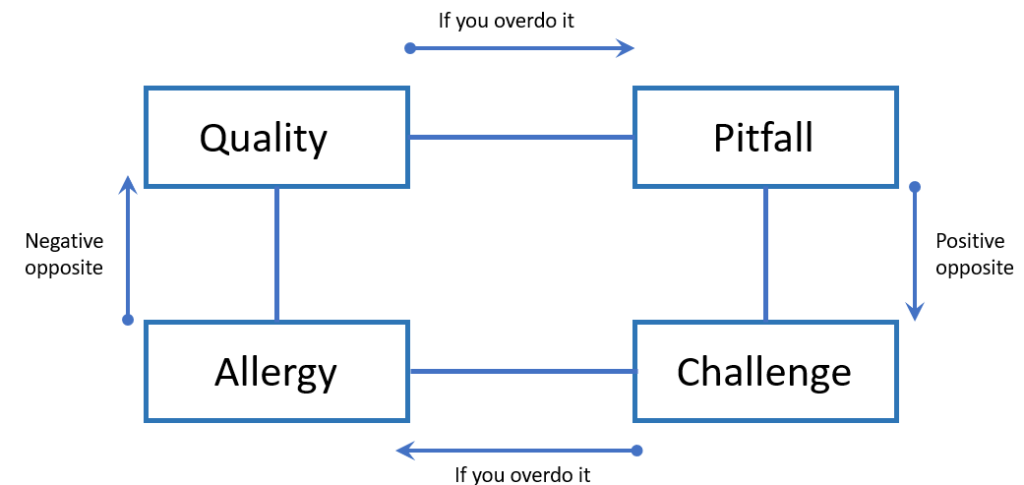
The Dutch and Time
(A calendar as the backbone for living your life)
October 2021 | Written by – Willem van Hoorn
Sometimes, in a new culture, people come across habits or ways of doing things that they’re not used to: a cultural difference. And in response they may show different reactions. On the one hand there may be curiosity and positive excitement (‘Oh, that is an interesting way to do this or that’). On the other hand there may be judgement, resistance or outright rejection (‘that is silly, stupid, not normal’).
In case you ever come across a cultural difference, and you need a little help to postpone being judgmental right away, the so called ‘model of core qualities’ may offer you a nice little tool to provide that help. The model was developed by Daniel Ofman, a long time TU Eindhoven graduate. In short the model states that people (or organizations, or cultures for that matter) have certain core qualities: they are good at certain things. However, if you overdo a quality, it becomes your pitfall. Someone (or a culture) with an opposite core quality can easily become your allergy. The interesting thing, though, is that you can usually learn from you allergy. In that case it becomes your challenge:

Ofman’s model came to mind when I was contemplating the topic of my blog post for this month: the time perception of the Dutch, and their by comparison extensive use of their calendars. Generally speaking: different cultures across the globe have different perceptions of time. Each of those time perceptions holds certain qualities. And hence, each comes with their own pitfalls, allergies and challenges.
Simplified a bit for educational purposes, you could say that there are two different, opposing perceptions of time. On the one hand there is the idea that time evolves linear, from past to present to future, from cause to consequence. Cultures with that perception usually see time as a resource, something that needs to be put to proper use. People tend to structure time, and to divide it into different chunks for different purposes.
On the other hand there’s cultures that see time as circular: everything keeps coming back. What do you mean: ‘time goes by’? Nonsense! Time stays, we go by! Time, if you take it into account at all, is abundant. It may occasionally be convenient, but it is not something to be overly worried about.

The average Dutchman definitively belongs in the first category. After the Swiss, the Japanese and the Germans, the Dutch probably have one of the strictest perceptions of time that you can come across. Time is money and an appointment is an appointment. If a train is five minutes late, people can be quite upset about it. And that strictness is not something they only apply to work situations.
Some time ago I had an interesting conversation with a colleague from Brazil. He thought he had noticed something, and he wanted to verify it with me: “Do Dutch people make appointments with their friends??” Almost in auto-pilot mode I replied: “of course we do”. He looked at me in utter amazement……. “If I would do that at home, it would be an insult! Appointments are for business relations, not for friends! If I would suggest to a friend to make an appointment, he would know that the friendship is over”.
Think of it what you may, it is how I, and many of my fellow countrymen organize our little lives. For a moment’, let’s ask Daniel Ofman to help us stay out of judgement-mode. In itself that strict Dutch time perception, and the use of the calendar, is a core quality. You know what to expect and when to expect it, both in work and in private life. It allows for structure and predictability. Over here it hits the newspaper when a project is NOT finished in time.
Having said that, if you overdo it, you enter a pitfall. You can become rigid. If something is not in your calendar, it is not at all. No room for spontaneity whatsoever. And someone with a lenient time perception easily gets into your judgmental allergy zone: “Hmmppf….. he is unreliable!” But then an interesting challenge opens-up: from that allergy you can learn to relax a bit. For instance to enjoy that someone comes to visit you at all, rather than to be grumpy about the fact that he is an hour ‘late’……
And this concludes my blog post for this month. To do a little bit of practicing with this way of thinking, I invite you to do the inverse exercise. The lenient time perception of my Brazilian colleague also is a quality in itself. It allows for flexibility and spontaneity, just to mention something. Can you finish Ofman’s model for my Brazilian colleague’s time perception? And do you think you can you keep applying it to cultural differences that you may come across in the future?
If you manage to see that exercise as a little game, you may actually have quite a bit of fun with it!

Willem van Hoorn
He works as a Policy Advisor Internationalization at Eindhoven University of Technology. He has been leading several projects and initiatives in the Brainport region to achieve integration and internationalization. When he’s not reading or writing, Willem is often brainstorming for innovative ideas, connecting with others, or bicycling towards the coast.
He is an exceptional Dutch Culture Expert and Storyteller!
To comment on this post or anything else you have seen on Expat Spouses Initiative page, please message us on Facebook or email us.

We Are Not Alone Campaign, is presented in collaboration with Expat Spouses Initiative – Eindhoven, LIVING IN, Holland Expat Center & Brainport Eindhoven. Through this campaign, we aim to bring the International community together and engage them actively.
In collaboration with

